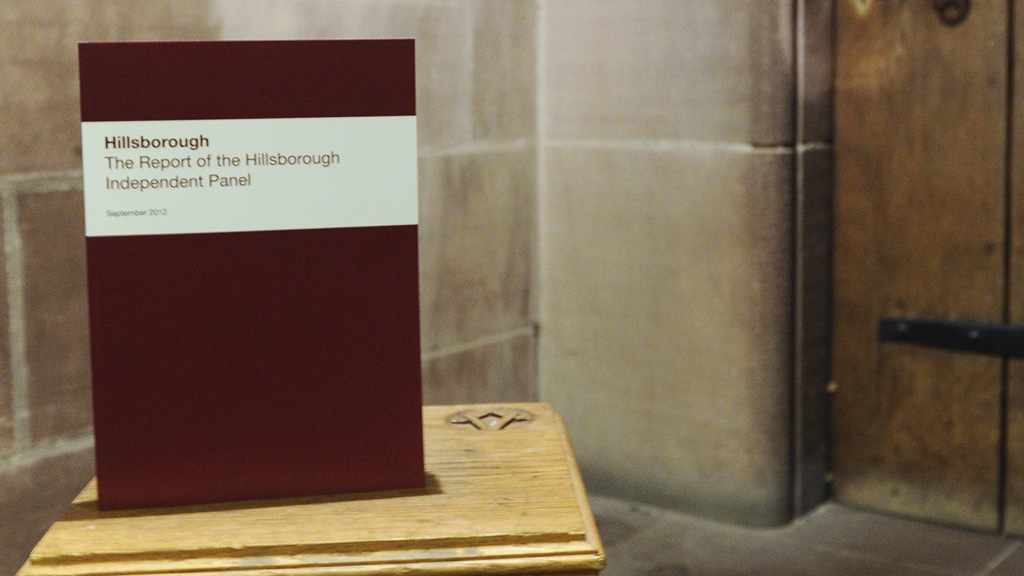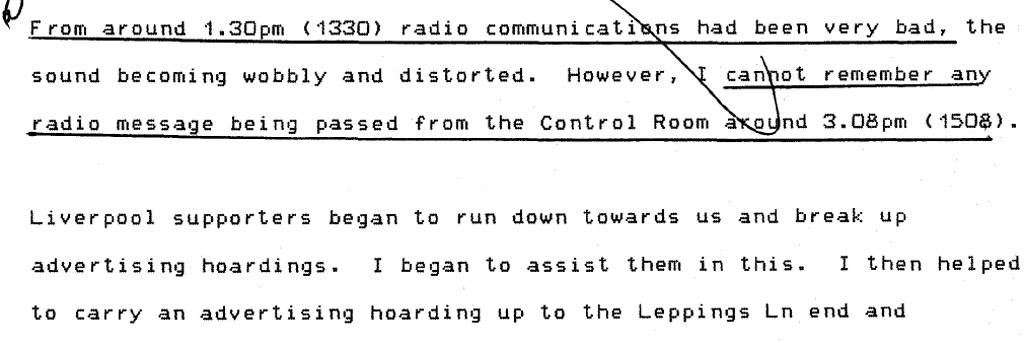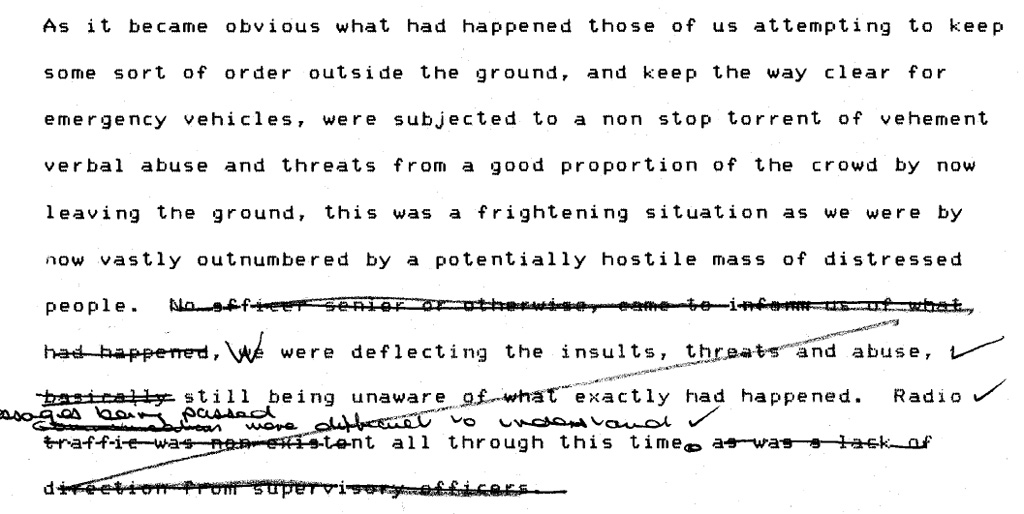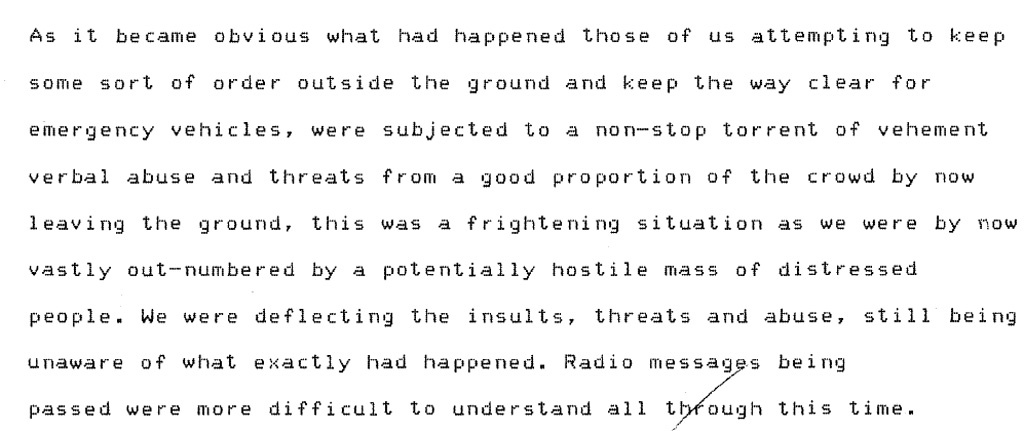Hillsborough: inside the library of a cover-up
At the heart of the Hillsborough scandal were the attempts by South Yorkshire Police and other institutions to absolve themselves from blame – now available in an online library of 450,000 documents.

The report from the Hillsborough Independent Panel found that 116 out of 164 statements were amended by senior officers at South Yorkshire Police in order to remove or change criticisms of the police force.
The justification for editing was that statements, which were later handed to the West Midlands police investigation and Lord Justice Taylor’s Hillsborough Inquiry, needed to be “factual” and without “conjecture and opinion”.
However, Wednesday’s report found that “the removal of conjecture or opinion was highly selective and officers’ comments on the hostility of the crowd remained as a statement of fact.”
The picture painted by the report is one of senior South Yorkshire officers, led by Chief Superintendent Donald Denton with the assistance of the force’s legal representative Peter Metcalf, vetting all statements from more junior officers to prevent damage being done to the force at a time when the force felt the feelings of the public turning against them.
So what was edited out of police statements?
Inadequate leadership
Around 41 statements were altered in order to downplay or remove criticisms of leadership on the day of the tragedy. Police Constable John Hood wrote in his statement: “Sergeants and inspectors appeared to be aimlessly milling around and direct radio control appeared to be lost. There did not appear to be any leadership.” The sentence was deleted.
Similarly the following passage from the statement of PC Alan Wadsworth was also deleted: “There was no leadership at the Leppings Lane end (where the disaster happened) following the disaster either in person or on the radio.”
PC Philip Foster’s words that “no-one was co-ordinating what we should do or saying where we should go” were changed to “I could not see anyone co-ordinating what we should do or saying where we should go”.
One of the most edited statements was that of PC Maxwell Groome. Large sections of his statement, which questioned decisions made by the force, were deleted.
(Below, an original extractof PC Groome’s statement)

(Below, the amended version of PC Groome’s statement)

In one section he listed points that he felt were relevant, including over a reduction of man-power before the game, the removal of an experienced senior officer from planning the police presence at the match, the quality of the staff in the control room, the deployment of officers and the general organisation of the event.
Of 10 points he made eight were deleted and one was altered. The only paragraph left untouched was one that referred to a history of drunken fans and violence when Liverpool FC played at Hillsborough.
Click on the links to compare the original version of PC Groome’s statement with the amended version.
Radio contact
In 48 instances statements were altered to minimise the appearance of difficulties when officers were communicating with one another by radio. A statement from PC Keith Bradley about the unfolding tragedy originally said:

It was changed to read:

The report highlighted that this paragraph was amended to change the meaning in relation to radio communications. However, criticism of the fans was left untouched.
In many examples referenced by the Hillsborough Panel, the statements of officers were changed so that the statements suggested difficulty in hearing messages, rather than a total lack of radio contact.
Chaos, fear, panic and confusion
A note to officers instructing them on how to compile their statements said that there should be no references to the word “chaotic” or any of its derivatives. Despite this, the statements of 23 officers had to be edited to remove the words “chaos”, “fear”, “panic” and “confusion”.
The following was deleted from the account of PC Martin McLoughlin: “As time went on this became thousands of people leaving the ground, streaming onto Penistone Road, which was full of ambulances etc. Basically it was chaos.”
(The original extract from PC McLoughlin is below)

(The amended extract from McLoughlin is below)

The following paragraph was also deleted from another statement: “The thing that strikes in my mind about those first few minutes is the state of panic that appeared to set in and apparently overcame senior officers. The command structure of the force totally broke down for several minutes and no one appeared to grasp the severity of the situation and take command.”
Why the editing?
In the immediate aftermath of Hillsborough a number of meetings were held by senior police officers in order to determine how to gather evidence from officers to assist with forthcoming enquiries.
The day after the tragedy a meeting was held, in which officers decided, unusually, that evidence would be taken from “recollections” rather than the usual method of pocket-book entries. These were for South Yorkshire’s internal investigation.
As time went on, however, it became clear that the evidence would be used in an investigation being conducted by West Midlands Police and in the inquiry being conducted by Lord Justice Taylor. This, according to a note written by Mr Metcalf, “gave rise to some concern” that the statements made by officers could be used in disciplinary proceedings or inquests.
As the requests for statements increased from West Midlands Police and the Taylor Inquiry, it was decided that for some of the statements “there would need to be some scrutiny of the existing documents” and that those statements which included “comment or matters of speculation would probably have to be redone”.
Hundreds of recollections were then vetted and altered by a team of officers, led by CSI Denton and Mr Metcalf. On 23 May an update was circulated to officers at South Yorkshire Police on the alterations being made to their original statements. It said that West Midlands Police had asked for “factual statements” and that this meant the best way to proceed was and to remove “matters of hearsay or comment”.
An earlier version of this note, drafted by Mr Metcalf, had drawn attention to the fact that these statements could be taken into account in the Taylor Inquiry, and that therefore criticisms made of “other officers, senior or junior” might be accepted by the inquiry without being challenged by cross-examination. Statements containing criticism, therefore, “should not be allowed to stand”, the note had said.
This was despite the fact that the inquiry had no objection to statements containing opinion, and in the view of the inquiry’s legal counsel, Andrew Collins QC, “there is absolutely no reason for excluding such expressions of opinion” where they touched on “matters relevant to the public inquiry.”
A following inquiry into South Yorkshire’s evidence, conducted by Lord Justice Stuart-Smith, questioned the reasons for editing the statements but said that there was no evidence of “irregularity and malpractice”.
-
Latest news
-
US campus protest arrests ‘very upsetting’, says Nobel Prize-winning Columbia professor7m

-
How are campus protests affecting US politics?1m

-
Welsh First Minister Vaughan Gething faces questions over campaign donations3m

-
Father of teenager who took her own life calls for greater autism awareness4m

-
Dublin police clear hundreds of asylum seeker tent2m

-




